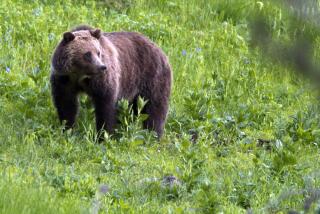Neanderthals liked their veggies, too
Neanderthals ate plants — and even cooked them — just as their human cousins did, according to a new analysis of Neanderthal teeth.
The work, published this week in the journal Proceedings of the National Academy of Sciences, shows that Neanderthals had a diverse diet similar to humans, and challenges the idea that limited food sources were to blame for Neanderthals’ disappearance about 30,000 years ago.
“It’s been thought they went mainly after large game, but we showed a much broader diet than that,” said study coauthor Dolores Piperno, an archaeobotanist at the Smithsonian Institution National Museum of Natural History in Washington, D.C.
Piperno said Neanderthals may have been considered pure meat eaters in part because plant foods don’t fossilize well, unlike gnawed animal bones. To explore further, she and her colleagues examined the calculus — plaque that has mineralized — fused to Neanderthal teeth to see if tiny bits of plants had been preserved.
The researchers looked at seven teeth from the remains of three Neanderthals, one from a cave in Iraq and two from Belgium, and analyzed the remnant plant bits they found trapped in the petrified plaque. Some of the plant materials were the remains of date palms, wild cereals, legumes and — in the Middle Eastern Neanderthal — a plant species akin to water lilies.
Some of the remains even showed signs of damage related to heating — which indicated the Neanderthals had cooked the plant before eating it. Cooking improves the plants’ nutritional value, Piperno said, by making them more digestible.
The scientists concluded that Neanderthals were not just hunters of big game and that they may have lived more complex culinary lives than previously thought.
Piperno said the work raised a number of interesting questions. “Did Neanderthals control fire in the way early modern humans did? How did Neanderthal diets evolve? These are questions that have to be addressed in future research,” she said.
Bruce Hardy, a paleoanthropologist at Kenyon College in Gambier, Ohio, who was not involved in the study, said the findings were clear evidence that Neanderthals did not die out because of their dietary preferences, as some scientists have suggested.
“We’ve painted a pretty unrealistic picture of Neanderthals as dimwitted,” he said, whereas the data from this study suggest their eating habits were quite sophisticated.
“You’ve still got plenty of people who, to my mind, don’t want to give them enough credit,” he said. “Neanderthals are defined by their extinction, so people focus on what they were doing wrong — and they forget that for some 200,000 years in Europe, they were really successful. They were prospering.”
The demise of the Neanderthal remains an open question, Hardy said. It could have to do with fertility or disease or any number of other reasons, “and it’s probably not one single factor,” he said.







